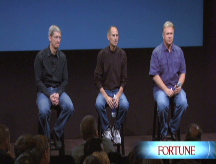Get well Steve, and get a plan
Steve Jobs' Silicon valley colleagues wish him the best, but like everyone else, they wonder what's next for Apple.
SAN FRANCISCO (Fortune) -- A day after Steve Jobs announced he would take a medical leave of absence, the Apple CEO's Silicon Valley colleagues are first and foremost wishing him well. There seems to be a consensus that Jobs has disclosed what he needs to, and that in the short-term, at least, the details of his health are a private matter.
But now more than ever, his colleagues also believe that Apple needs to put forth its plan for a scenario where Jobs does not return in a full-time capacity.
"Let him deal with his health on his own, it is not a business issue," says Marten Mickos, a senior vice-president at Sun Microsystems (JAVA, Fortune 500). "No matter whether CEOs are healthy or not, there is always a risk that they will suddenly become unable to do their job. What could be discussed publicly is what kind of succession plan Apple generally has. That's a worthy topic in my mind."
One of Google's (GOOG, Fortune 500) earliest investors Ram Shriram agrees. "It is especially important for large-cap companies to have a clear plan of succession in place for any eventuality," he says. "Companies where there is continuity without disruption in the succession planning process tend to do better over the long-term."
How well Apple (AAPL, Fortune 500) would fare without Jobs is, of course, the next area of focus here in the Valley and beyond. Jobs gave Salesforce.com (CRM) CEO Marc Benioff his first job writing software in 1984. "There is no greater leader in our industry than Steve Jobs," Benioff says.
That said, But most in the Valley think Apple will continue to dominate its competitors even without Jobs at the helm day today. Consider the runaway success of the iPhone, and the increasing share of the PC market Apple is grabbing.
"Apple has never been in a stronger position than it is today," says Bill Gurley, a venture capitalist with Benchmark Capital. "If the company can't succeed with the head-start, then it is a sad indictment of just how hard it is to hire great CEOs."
Gina Bianchini, a Cupertino native and CEO of Web startup Ning, suggests looking at Apple's financial results as a barometer during Jobs' absence. "If Apple continues to knock it out of the park - or at least doesn't crash and burn while others limp along - then he's done what he needed to do to ensure the ongoing health and success of Apple."
Pinning the future of the company on Jobs is not fair to the team he has put in place, says Marc Hedlund, CEO of Web startup WeSabe, and a force in the Valley's open software movement.
"I think Apple did the right thing, and all the sturm und drang about it is ridiculous," Hedlund says. "I hope Steve gets better quickly and gets back to work, but on the other hand, Apple is made up of a huge number of extremely talented people. Putting too much emphasis on Steve's health as the sole determiner of Apple's worth is an insult to the people who work so hard to make Apple's products great." ![]()
-
 The retail giant tops the Fortune 500 for the second year in a row. Who else made the list? More
The retail giant tops the Fortune 500 for the second year in a row. Who else made the list? More -
 This group of companies is all about social networking to connect with their customers. More
This group of companies is all about social networking to connect with their customers. More -
 The fight over the cholesterol medication is keeping a generic version from hitting the market. More
The fight over the cholesterol medication is keeping a generic version from hitting the market. More -
 Bin Laden may be dead, but the terrorist group he led doesn't need his money. More
Bin Laden may be dead, but the terrorist group he led doesn't need his money. More -
 U.S. real estate might be a mess, but in other parts of the world, home prices are jumping. More
U.S. real estate might be a mess, but in other parts of the world, home prices are jumping. More -
 Libya's output is a fraction of global production, but it's crucial to the nation's economy. More
Libya's output is a fraction of global production, but it's crucial to the nation's economy. More -
 Once rates start to rise, things could get ugly fast for our neighbors to the north. More
Once rates start to rise, things could get ugly fast for our neighbors to the north. More











